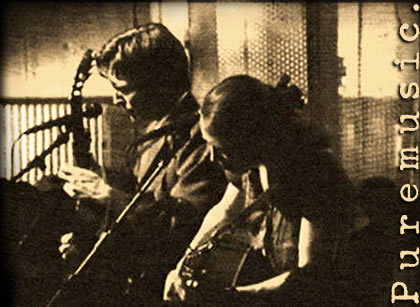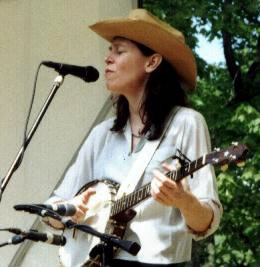
The Ghostly
Ones (continued)
Welch and Rawlings appear often on the Grand Ole Opry. They also perform in clubs in the United States and abroad, where their audiences tend to consist of between a thousand and two thousand people. They play very quietly. Welch sang so much by herself in her room that she never learned to sing above the sound of other musicians. Audiences at even the beeriest clubs attend them closely, as if they were at the theatre. Her voice resonates more in her head than in her chest. Its range is not wide--it is more an alto than a soprano--and it has a mournful, vernacular, almost factual quality, as if she were a witness to the scene she is describing. She conveys emotion through dynamics, not vibrato, and by a self-effacing absorption with the narrative. What ornamentation she employs comes mainly from bluegrass and brother-team singing--the pounce on certain syllables, the dying falls, the trills, the quick fades and returns, the small tear--though she manages, partly by the solemnity of her bearing, to give the impression of singing without artifice, which in itself is dramatic.
At Carrboro, Welch and Rawlings played in a club called Cat's Cradle. As on many nights of the tour, they shared the bill with the Old Crow Medicine Show, a charismatic, punked-up string band from Nashville. Rawlings sometimes plays with Old Crow. When he does, he is occasionally introduced as Butch Hobson. All of them shared a small dressing room. On the door, in permanent marker, was written, "I Hate This Part of Texas." Welch changed into a full skirt and a sleeveless velvet top. Then she sat on the edge of a small armchair and folded her skirt demurely between her knees and Ketch Secor, the fiddle player from Old Crow, brought out a shoeshine kit and polished her cowboy boots. "It's what the opening act does," he said, "shine the headliner's shoes."
Narrow stairs led to a sitting room in the wings above the stage. Morgan Jahnig, the bass player for Old Crow, came down the stairs and said, politely, "Does the name Jerzy Kosinski mean anything to anyone? It just came into my head."
Welch gathered her skirt and climbed the stairs and sat in a chair. On the pages of a small, lined notebook, she printed a set list in block letters. I went out into the club to listen to Old Crow. From the far corner of the floor, as if through a window, I could see Welch upstairs, seated in front of a mirror, brushing her hair, then turning her head from side to side until it fell to her liking.

Rawlings's account of Welch's past began shortly after we left Denny's. Welch had settled herself on the back seat and said, "I'm still waiting to hear the Gillian Welch story, by David Rawlings." We had arrived at her departure for Santa Cruz when Rawlings paused, as if he had something delicate to impart. "At this point, her family," he said, "they've kept her on a pretty tight leash."
"No boyfriends," Welch said.
"She goes to U.C. Santa Cruz, and when do you start playing in bands?"
"Soon as I get there," Welch said. "The first one was called Penny Dreadful, a Goth band, because that's what my friends were playing. I was very pale, and my hair was very blond from being from California and in the sun all the time. I'm on a bass I borrowed. It doesn't last very long. I was not a real creative force in that band."
"At college, though, things deteriorate pretty quickly," Rawlings said thoughtfully. He paused again. "I don't know, Gill," he said, looking opaquely out the windshield at the road. "How accurate do you want this to be?"
"Accurate," she said.
"O.K.," Rawlings said. "So Gill's getting drunk and taking drugs all the time."
"I immediately spin out," Welch said.
"After a very cloistered life," he said.
"I hadn't been a very social person in high school," she said. "I kept to myself. I had friends, but college is so different. You arrive and whatever you want to be you are. The question is, who do you want to be?"
"There are other bands," Rawlings said, as if to return Welch's attention to the story.
"I was the drummer in a psychedelic surf band, Thirteenth-Floor something or other," Welch said. "I don't think we had a singer. We probably had only a handful of gigs, and most of them were house parties. I was always extremely high on acid, and I wouldn't realize that the song had ended, so there were a lot of drum solos."
Welch took classes in art and ceramics and became interested in photography. She moved into a house whose other tenants were members of a bluegrass band that played at a pizza parlor, and she went to all their gigs. "When I discovered bluegrass music, it was like an electric shock that it meant so much to me," Welch said. "I hadn't heard people playing the music I had sung as a kid, and it made me think, I know these songs, and I sound good singing them. I realized this was possible."
"Do you start performing?" I asked.
"A couple of gigs, and they scare me to death."
"And how are they received?"
"Well, I don't think I was singing very loud, and there was no mike," she said. "I sort of go and play them, but everything about how I look says, 'Pay no attention to me.'" continue